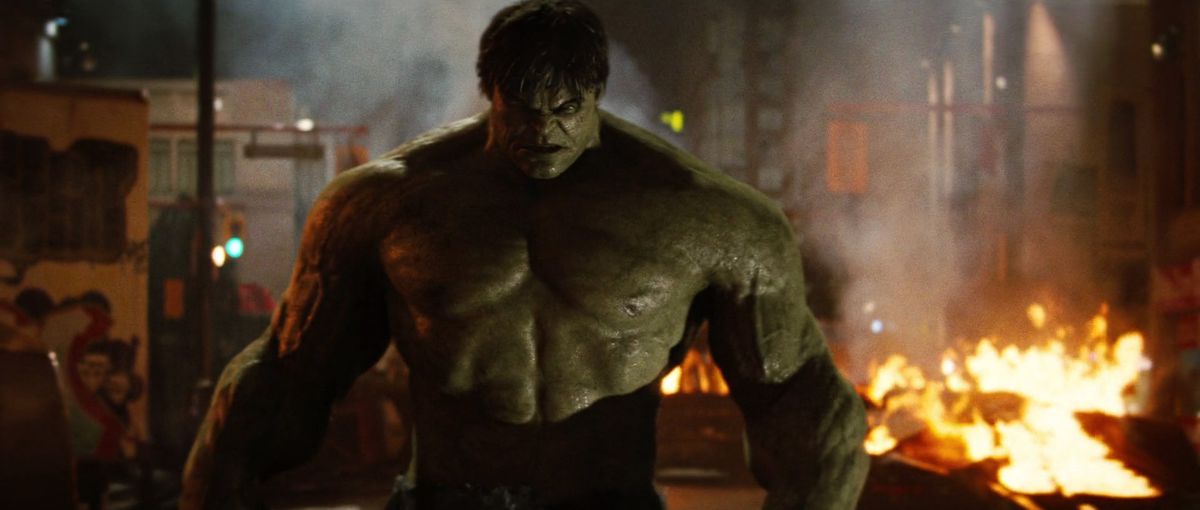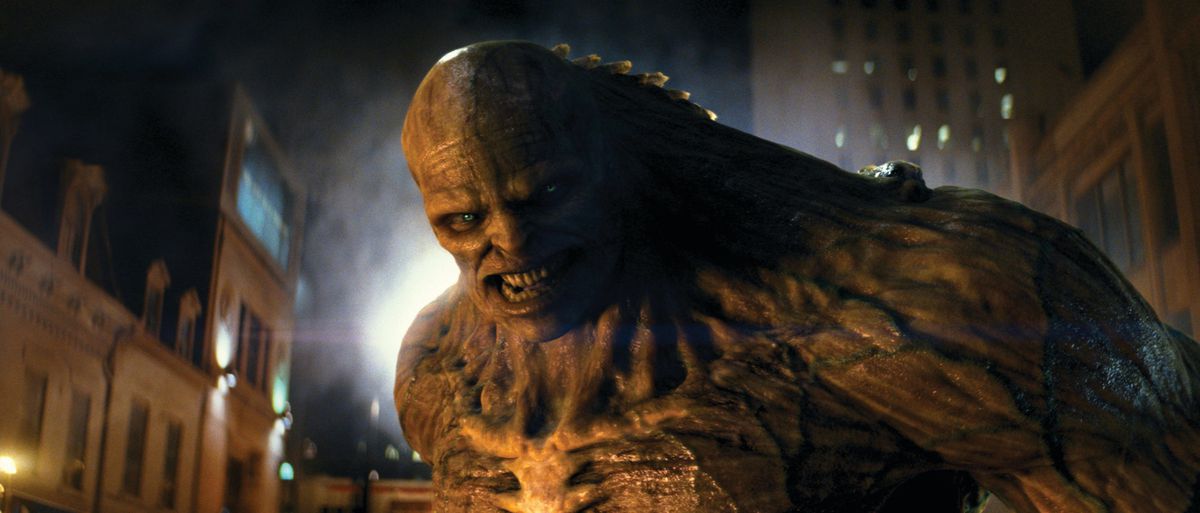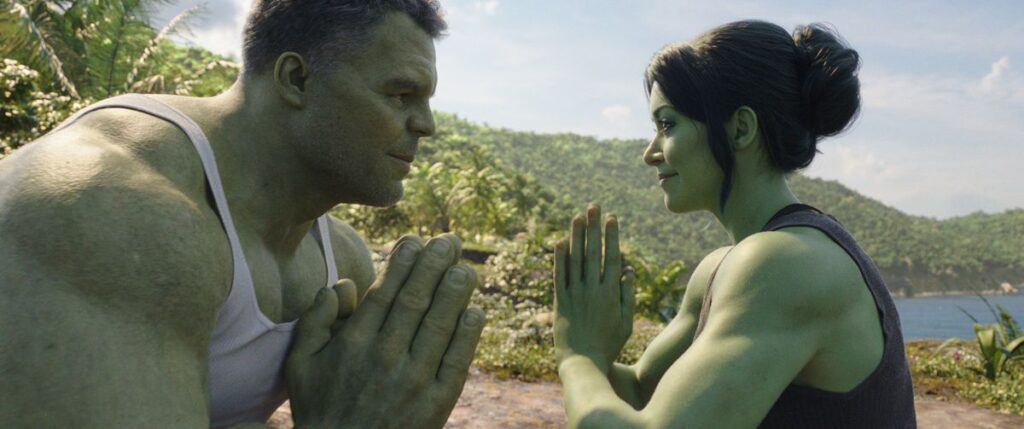It’s been a wild 18 months for the Marvel Cinematic Universe. Not only has the multi-billion-dollar franchise expanded into TV, but it’s started to use the medium to recontextualize the films that built its empire in the first place. And no series has done more work in that regard than She-Hulk: Attorney at Law, which sets one of the oldest MCU supervillains back on the board.
It’s a clear sign that Louis Leterrier’s much maligned 2008 movie The Incredible Hulk is back in the forefront of the MCU.
[Ed. note: This piece contains spoilers for She-Hulk: Attorney at Law episode 9.]
Image: Marvel Studios
She-Hulk’s finale episode may have poked fun at a lot of Marvel tradition, but it kept one going: a mid-credits scene, one in which Wong, the Sorcerer Supreme, freed Emil Blonsky, the Abomination, from jail and created one more dangling plot line that any future Marvel project could pick up.
And Emil Blonsky isn’t the only villain from The Incredible Hulk whose revival has become a part of the modern MCU — weaving a movie that was barely considered a part of Marvel’s multiverse firmly into the tapestry.
The Incredible Hulk who?

Image: Marvel Studios/Universal Pictures
Released in the shadow of the game-changing Iron Man, it’s not hard to understand why The Incredible Hulk has long been lost in the doldrums of the MCU’s Phase One. Though it aligned the MCU’s version of the Hulk closer to the comics than Ang Lee’s 2003 Hulk movie, it also played it relatively safe. The movie introduces Bruce Banner (Edward Norton) already hulked, and already on the run. He faces off against classic Hulk antagonists Thunderbolt Ross (William Hurt) and the Abomination (Tim Roth), and we meet his lifelong comic book love, Betty Ross (Liv Tyler), who drives Bruce to control the monster within.
With the 20-plus MCU movies that have come since, and Mark Ruffalo’s far more popular iteration of the character, 2008’s The Incredible Hulk seemed to be destined to be forgotten. Then came Shang-Chi and the Legend of the Ten Rings.
That frantic and fun family saga featured Wong (Benedict Wong) battling with The Incredible Hulk’s villain the Abomination in an underground fighting ring. The choice surprised some MCU fans who had assumed that The Incredible Hulk was all but a memory. That reconsideration has continued with the arrival of She-Hulk, one of Marvel’s most iconic legacy characters, in her own self-titled Disney Plus series. In that context, revisiting The Incredible Hulk makes a lot of sense, as Jennifer Walters’ (Tatiana Maslany) origin is directly connected to that of her superpowered cousin. The latest Disney Plus series was eager to show that this was more than just a cameo as Emil Blonsky (Tim Roth, returning to the role) became a major part of Jen’s story and gave Bruce the closure he needed, as well as treating the audience to a meta-nod to Ruffalo’s recasting.
While all of that could be explained away as Hulk business fit for a Hulk story, during D23 it became clear that the MCU wasn’t finished with The Incredible Hulk. In one of the most surprising pieces of news from that sprawling weekend, it was revealed that Tim Blake Nelson would be returning to the MCU as the infamous Incredible Hulk villain the Leader in Captain America: New World Order. Though it might seem like an unexpected diversion, when we look back at The Incredible Hulk it’s actually surprising that the MCU hasn’t returned to its sophomore entry sooner.
The MCU was built on the backs of heroes who were, in 2008, by no means A-list. Iron Man, Nick Fury, Captain America, and Thor were far from the cultural icons they are today. If we look at that roster as it was then, it’s clear that the Hulk was the most well-known hero Marvel Studios had access to. Thanks to decades of comics and his titular — and very popular — TV series, Bruce Banner and his alter ego should have been the big MCU smash.

Image: Marvel Studios/Universal Pictures
But years of licensing issues meant Universal held the rights to the character, which led to Marvel Studios collaborating with Universal to make The Incredible Hulk happen. And if we’re looking at important precedent and the impact of The Incredible Hulk, that’s a corporate deal as huge the Marvel Studios/Sony Pictures collaboration that brought Peter Parker to the MCU in Spider-Man: Homecoming.
It wasn’t just a trailblazer in a behind-the-scenes sense, though; The Incredible Hulk also reimagined Bruce Banner’s origin in a way that would become key to the future of the MCU. In the classic comics, Bruce’s powers come from experiments with gamma radiation. But in The Incredible Hulk, the film repositions his origin as one with a far wider context. Here Bruce was trying to re-create the original Super Soldier Serum — a recurring theme and mistake that would be repeated throughout the MCU — and to do so he replaced the original formula’s vita radiation with gamma radiation. The Incredible Hulk is the first place that the Super Soldier Serum was introduced, and it’s the reason that the MCU has a Hulk at all. And soon, Emil Blonsky joined him.
And then there was The Incredible Hulk’s Thaddeus “Thunderbolt” Ross. One of the primary antagonists in the Hulk comics, Ross became a military mainstay in the MCU even as his path diverged from his would-be son-in-law. In fact, Ross became such a major player that it would have been easy — especially without the presence of Tyler’s Betty — to forget that he was connected to Bruce at all. With She-Hulk finally acknowledging the current Hulk’s relationship to the film where the Ross family debuted, that could potentially change. Although the tragic death of Hurt means we likely won’t see Thaddeus again, we could see the return of Betty — technically we already have, in an episode of What If…? She’s just another vital part of Hulk lore that was established in the movie… like the Leader.
Samuel Sterns was introduced in The Incredible Hulk as a friend to Bruce Banner — who eventually betrayed him and played a part in creating the Abomination — that we last saw transforming into the Leader after gamma radiation found its way into his bloodstream. As The Incredible Hulk never got a direct sequel, fans never found out his fate. But that stands to change in 2024, when Captain America: New World Order hits theaters. And why not? The Incredible Hulk is ripe for revisiting. The film introduced so many key parts of Bruce’s lore. Why not reintroduce them in the modern day?
Aside from the fact that Marvel Studios is unlikely to let any part of its cinematic oeuvre slip out of canon, the return to The Incredible Hulk actually takes from one of the best things about comic book storytelling. A creator can bring something to life that can then lay dormant for years before someone else rediscovers it and gives it meaning once again. As the MCU grows, we can expect more of this kind of reconsideration and excavation, and that’s pretty great.

